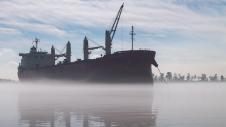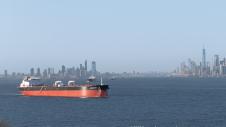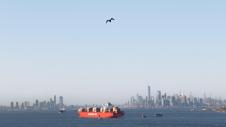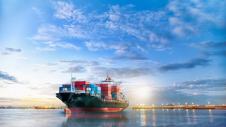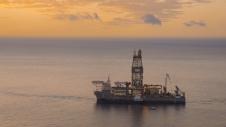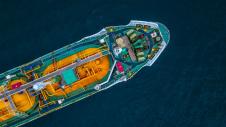Early in the morning of March 23rd, one of the largest containerships in the world, the M/V ‘Ever Given’, entered the south mouth of the Suez Canal in Egypt for what supposed to a be a routine, one among the 3,200 crossings of the Canal each year[1], 120-mile long, fourteen hour northbound passage to bring the ship to the Mediterranean Sea en route to its final destination, the Port of Rotterdam. Ten days later, the vessel still has not exited the Suez Canal as it’s anchored in the Great Bitter Lake, part of the Canal, undergoing safety inspections.
As everyone who watched TV in the last ten days knows by now, the Ever Given was grounded within 45 minutes of entering the Suez Canal and blocked all Canal marine traffic in a very spectacular way.
In a world with already stretched supply chains, the blockage of the Canal caused grave concerns that end-product imports to North Europe and the East Coast of North America may lead to less-than-fully stocked shelves. Besides its visual impactfullness of watching a monstrously large ship blocking one of world’s largest man-made structures, the grounding had a clear consumer interest should the Canal blockage turn out to last more than a transient hiccup of the lengthy voyage.
In today’s world, shipping is mostly a B2B business with the end consumer rarely bothering with the adventures of raw commodities dug out from a remote mine and then shipped to the industrial floor and to the production floor and to the assembly floor and finally to the department store shelf, quite often requiring a leg of shipment (by sea, often) along the way.
The maritime industry (most colloquially known as the “shipping industry” to its practitioners) is among the oldest professions in the world, with written records of shipment of logs by ship dating back to 2600 BC in Egypt[2], of all places. Shipping has been the backbone of global trade ever since with most notable examples of China’s Treasure Ships and Portugal’s Caravels, both developed in the 15th century, to the Clipper Ships of the 19th century and the leviathan ships of the 21st century.
However, most of us never take much notice of the maritime industry -besides taking an occasional picture of a fancy cruiseship or navy ship coming to port, or until there is an era defining maritime disaster such the sinking of the S/S "RMS Titanic", the pollution caused by the tanker M/T "Exxon Valdez", and now the blocking of the Suez Canal by the containership MV "Ever Given". We are not claiming that the notoriety of the last ship will ever match that of the first two, but definitely, because of the last ship, now lots of tough questions will have to be probed, at a time when the industry stands at the crossroads of an industry-wide inflection point.
There are almost 93,000 self-propelled commercial ships in the world[3], and a multiple of that number when smaller coastal and inland vessels are counted. More than 80% of the global trade is carried out by sea annually,[4] or more than eleven billion tons[5] of cargo (just about 42,000 tons at every given minute). In terms of money, more than fourteen trillion dollars worth of merchandise was shipped in 2020, which was not a particularly robust year in terms of world trade. One would think that, with such monumental numbers (freight and freight commissions, too), everybody involved with the maritime industry should have a trace of a shipping magnate in their blood!
Speculative investments, huge losses
The truth, however, is far from that. By some accounts, just the European shipping banks, the industry’s primer financier until the last decade, had to take more than hundred billion dollar in losses[6]. Speculative investments in the last decade have caused a market collapse that has affected all shipowners alike globally, that had given concern for shipping operations and safety, and the occasional disruption of shipping operations as loaded with cargo ships were arrested for financial defaults, affecting the operations of innocent bystanders like shippers. Operational and safety concerns were underlined with the COVID19 pandemic, as many countries stopped allowing crew changes in their waters with more than 200,000 seafarers still stranded onboard ships as of March 2021, causing the International Maritime Organization (IMO) to call the situation as a “humanitarian, safety and economic crisis”[7].
At a time when the maritime freight market was historically low, new IMO emission regulations implemented in January 2020 that mandated for the industry to switch to cleaner fuels (fuels with a sulphur content less than 0.5% as compared 3.5% before) for propulsion. Marine transport releases 940 million tons of CO2 each year[8](just a tad below 2% of the 51 billion of tons of carbon the world releases annually[9] and about 2.5% of global greenhouse gas (GHG) emissions[10].
For an industry that burns 300 million tons of bunker fuel each year[11], the implications are huge both in short term economic terms (cost of shipment via seaway transport and who bears such an increase) and in longer environmental terms if to meet IMO’s guidelines to reduce carbon emissions from shipping by 40% by 2030 and by 70% by 2050 from 2008 levels[12].
The end consumer has been saved the debate on marine fuel quality and the tremendous incremental costs for now, but the "Ever Given" incident is a reminder of the hard decisions that have to be made, decisions that the average person better be aware of, given their economic and environmental repercussions. At the end of the day, cleaner fuels come at a cost, a cost that so far has not been passed on to the consumer. And, as ships are long lasting capital assets with approximate twenty-five year lifespan, decisions made now future generations will have to live with.
"Dinosaurs of assets"
In the early ages of my career in the industry, I once heard someone describing ships as dinosaurs of assets with big bodies but small brains; and, the sleekness of certain ship designs aside, ships have tended to be dumb big things that have not much evolved in the last four decades or so. However, exciting new designs and new technologies have been accelerating the industry’s move forward, from the prospect of new, cleaner “alternative” fuels (batteries, solar, wind, ammonia, methanol, LNG and even nuclear energy) to software that simplify navigation and engage in preventive maintenance of ships, engages with Internet of Things (IoT) and routing optimization to the exciting possibility of autonomous ships. For a ship like the "Ever Given" valued at $180 mil. just for its hull, in addition to the centi-million value of the cargo, the prospects of change can be both exciting and daunting at once—both for industry professionals but also for the end consumer.
The current pandemic has ushered us in an era of increased awareness of our mundane, everyday decisions as employees, as consumers, as citizens. The human race has grown to such an extent as to leave little free space in our planet, as even our new ships seem too big to fit in last decade’s infrastructure (the Suez Canal was expanded as recently as in 2015). The maritime industry does not face the risk of extinction as human economic activity cannot do without the actual shipment of materials, but the challenges for the industry will be felt by the end consumer. And, possibly for the better, the end-consumer may need be more involved, at the very least more aware, with developments in the industry given the long-lasting and global impact of the decisions to be made as the ‘Blue Economy’ gets a more central seat in our lives.
We may have to thank the good vessel MV "Ever Given" and its fateful Suez Canal passage for bringing to the surface the underlying issues of the maritime industry is facing. Let’s hope that the legacy of the MV "Ever Given" will be kinder than those of the "RMS Titanic" and the "Exxon Valdez". However, its impact on society may be equally profound as maritime executives, charterers and shippers, and, mostly consumers, have to make strategic decisions that will have long repercussions for decades to come. The maritime industry, need not be the invisible industry until a catastrophic accident happens.
Basil M. Karatzas is the Founder of Karatzas Marine Advisors & Co and Karatzas Auctions, active in the maritime industry as financial advisors, shipbrokers and marine appraisers. Mr Karatzas is a Certified Marine Surveyor, an Accredited Senior Appraiser for marine assets, and a Fellow with the Institute of Chartered Shipbrokers in the UK.
[1] https://www.suezcanal.gov.eg/English/Navigation/Pages/NavigationStatistics.aspx
[2] The Ancient Mariners, Lionel Casson, 2nd Edition, Princeton University Press, 1991, pp 6.
[3] https://unctad.org/system/files/official-document/rmt2017ch2_en.pdf
[4] p4 https://www.imf.org/en/Publications/WP/Issues/2020/05/14/World-Seaborne-Trade-in-Real-Time-A-Proof-of-Concept-for-Building-AIS-based-Nowcasts-from-49393
[5] https://ihsmarkit.com/research-analysis/outlook-for-global-trade-in-2020.html
[6] https://www.nytimes.com/2012/01/26/business/global/the-global-downturn-weighs-on-shipowners-and-european-banks.html
[7] https://www.imo.org/en/MediaCentre/HotTopics/Pages/FAQ-on-crew-changes-and-repatriation-of-seafarers.aspx
[8] https://ec.europa.eu/clima/policies/transport/shipping_en
[9] https://hbr.org/2021/03/it-will-need-to-be-the-most-amazing-thing-humankind-has-ever-done?utm_medium=social&utm_campaign=hbr&utm_source=twitter&tpcc=orgsocial_edit
[10] https://ec.europa.eu/clima/policies/transport/shipping_en
[11] https://www.sciencedirect.com/science/article/pii/B9780128140543000025
[12] https://www.imo.org/en/MediaCentre/HotTopics/Pages/Reducing-greenhouse-gas-emissions-from-ships.aspx



